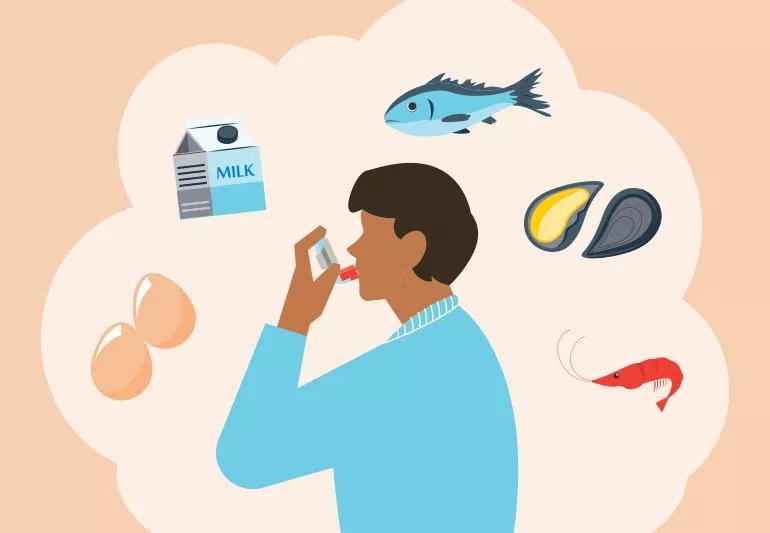Some foods might aggravate the condition

Have you ever eaten something and then broken out in hives? Or ended up with a rash or worse — nausea, vomiting or diarrhea? Reactions like these to foods are considered adverse reactions that can stem from food intolerances or allergies. Allergy and clinical immunology specialist Ahila Subramanian, MD, MPH, helps us understand these reactions and reveals if they can affect asthma.
Advertisement
Cleveland Clinic is a non-profit academic medical center. Advertising on our site helps support our mission. We do not endorse non-Cleveland Clinic products or services. Policy
Any reaction to a food that’s abnormal is considered an adverse reaction. Adverse reactions are classified either as a food intolerance or a food allergy. “These two terms are often mistakenly used interchangeably, but it is important to know the difference as the approach to diagnosis and treatment differs greatly,” says Dr. Subramanian.
A food allergy is defined as an overreaction by your body’s immune system to proteins in foods that are usually safe or harmless. The overreaction is caused by Immunoglobulin E (IgE), antibodies that can cause allergic reactions in your nose, throat, lungs, skin or circulatory system.
Food intolerance is an abnormal response to an ingested food that’s not an allergy. Food poisoning, difficulty digesting specific foods and reactions to chemicals in food or drinks like caffeine are some examples of food intolerance.
Food is not a normal asthma trigger. On the other hand, if you have a food allergy, asthma can make allergic reactions worse. The most common symptoms of food allergies are hives, rash, nausea, vomiting and diarrhea.
The most common foods associated with allergic symptoms are:
Advertisement
When eaten in large amounts, some food additives — like sodium bisulfite, potassium bisulfite, sodium metabisulfite, potassium metabisulfite and sodium sulfite — can irritate asthma. These additives tend to be preservatives and can be found in the following foods:
If you feel like certain foods could be making your asthma worse, talk to your healthcare provider. They can perform tests to determine if you’re allergic.
“It is important to note that skin testing and most blood tests are not useful in the diagnosis of food intolerance,” Dr. Subramanian cautions. “A doctor who specializes in allergies and immunology can determine if a reaction is consistent with a food allergy or food intolerance by reviewing your medical history. Based on this, they can advise the appropriate next steps.”
If a food trigger is identified, avoiding the food is the best way to prevent asthma reactions. It’s also important to read food labels — and when dining out, make sure the dish you’re interested in isn’t made with ingredients that you’re allergic to.
Advertisement
Learn more about our editorial process.
Advertisement

Plus, 7 ways to avoid asthma attacks during cold weather

Infections, like the flu, are a common asthma trigger

Plus, 8 ways to asthma-proof your home

Most recommended precautions center around minimizing bruising or swelling

Even one drink can have an impact on your cognitive function leading to slurred speech, blurred vision and impaired memory

Understand who may (and may not) benefit

Type 2 diabetes isn’t inevitable with these dietary changes

Applying a hot or cold compress can help with pain